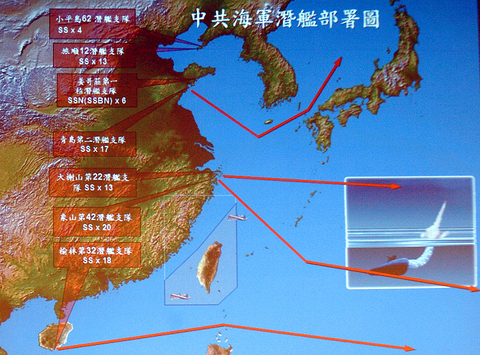Taiwan must upgrade and expand its submarine warfare capabilities if it is to prevent China, which will have its first aircraft carrier battle group by 2020, from surrounding the island from the east with its blue-water navy in the future, a high-ranking defense official said.
Chen Yung-kang (陳永康), director of the Ministry of Defense's Integrated Assessment Office, said the group would consist of 11 warships, with the recently acquired Varyag aircraft carrier and a Kiev-class helicopter carrier -- both Soviet-era vessels -- serving as its centerpiece.
Seven surface ships and two nuclear attack submarines will make up the remaining nine vessels, Chen said.

Chen made the remarks at a symposium yesterday morning, which was hosted by the Institute for Taiwan Defense and Strategic Studies to discuss the navy's planned purchase of eight submarines from the US.
Vice Admiral Tung Hsiang-lung (董翔龍), chief of staff of the Navy Command Headquarters, said that the US government has requested a down payment of US$360 million as a guarantee for the deal, given that Taiwan's opposition has continuously blocked the budget for the purchase of the submarines in the legislature.
"[The US government's] attitude is quite clear," Tung said. "If we do not give a down payment, they will not begin to hire European contractors to build the vessels for us."
The US government has to hire European contractors to build the eight diesel submarines for Taiwan since the US does not build diesel submarines anymore.
"After making the down payment and deciding on the European contractors, we will ask for blueprints of the vessels before they begin to build the submarines for us. When the blueprints are approved, we will then submit them to the legislature for a final approval," Tung said.
While the navy is willing to fork out US$360 million, Tung said it would not pay the US anything more unless it received assurance that what the US is selling is what the navy really needs, Tung said.
The navy's acquiescence to the down payment has been criticized by the opposition and some mem-bers of the public as extortion by the US.
"But, [the down payment] is not a form of extortion. The down payment is actually a show of our determination and guarantee to the US and potential European contractors that Taiwan will definitely carry out the contract. It also shows our determination to defend ourselves," Tung said.
Chu Tsung-jung (
Additional reporting by Hsu Chao-hsuan

Right-wing political scientist Laura Fernandez on Sunday won Costa Rica’s presidential election by a landslide, after promising to crack down on rising violence linked to the cocaine trade. Fernandez’s nearest rival, economist Alvaro Ramos, conceded defeat as results showed the ruling party far exceeding the threshold of 40 percent needed to avoid a runoff. With 94 percent of polling stations counted, the political heir of outgoing Costa Rican President Rodrigo Chaves had captured 48.3 percent of the vote compared with Ramos’ 33.4 percent, the Supreme Electoral Tribunal said. As soon as the first results were announced, members of Fernandez’s Sovereign People’s Party

EMERGING FIELDS: The Chinese president said that the two countries would explore cooperation in green technology, the digital economy and artificial intelligence Chinese President Xi Jinping (習近平) yesterday called for an “equal and orderly multipolar world” in the face of “unilateral bullying,” in an apparent jab at the US. Xi was speaking during talks in Beijing with Uruguayan President Yamandu Orsi, the first South American leader to visit China since US special forces captured then-Venezuelan president Nicolas Maduro last month — an operation that Beijing condemned as a violation of sovereignty. Orsi follows a slew of leaders to have visited China seeking to boost ties with the world’s second-largest economy to hedge against US President Donald Trump’s increasingly unpredictable administration. “The international situation is fraught

MORE RESPONSIBILITY: Draftees would be expected to fight alongside professional soldiers, likely requiring the transformation of some training brigades into combat units The armed forces are to start incorporating new conscripts into combined arms brigades this year to enhance combat readiness, the Executive Yuan’s latest policy report said. The new policy would affect Taiwanese men entering the military for their compulsory service, which was extended to one year under reforms by then-president Tsai Ing-wen (蔡英文) in 2022. The conscripts would be trained to operate machine guns, uncrewed aerial vehicles, anti-tank guided missile launchers and Stinger air defense systems, the report said, adding that the basic training would be lengthened to eight weeks. After basic training, conscripts would be sorted into infantry battalions that would take

GROWING AMBITIONS: The scale and tempo of the operations show that the Strait has become the core theater for China to expand its security interests, the report said Chinese military aircraft incursions around Taiwan have surged nearly 15-fold over the past five years, according to a report released yesterday by the Democratic Progressive Party’s (DPP) Department of China Affairs. Sorties in the Taiwan Strait were previously irregular, totaling 380 in 2020, but have since evolved into routine operations, the report showed. “This demonstrates that the Taiwan Strait has become both the starting point and testing ground for Beijing’s expansionist ambitions,” it said. Driven by military expansionism, China is systematically pursuing actions aimed at altering the regional “status quo,” the department said, adding that Taiwan represents the most critical link in China’s